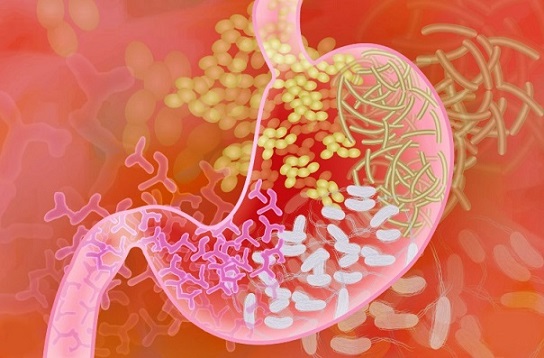Hospitalized Children with COVID-19 Found to Have Disrupted Gut Microbiomes and Missing Key Vitamins
Nikhil Prasad Fact checked by:Thailand Medical News Team May 22, 2025 8 months, 3 weeks, 1 day, 20 hours, 28 minutes ago
Medical News: A groundbreaking new study has found that children hospitalized with COVID-19 suffer from serious disturbances in their gut bacteria and a shortage of important vitamins in their stools, potentially affecting their ability to recover from the virus. The research, conducted by a team from various Spanish institutions including the Instituto de Productos Lácteos de Asturias (IPLA-CSIC), Hospital Universitario Infantil Niño Jesús in Madrid, and Hospital Clínico Universitario de Santiago in Galicia, looked at the faecal microbiota and metabolite profiles of children admitted with COVID-19 compared to healthy kids.
 Hospitalized Children with COVID-19 Found to Have Disrupted Gut Microbiomes and Missing Key Vitamins
Hospitalized Children with COVID-19 Found to Have Disrupted Gut Microbiomes and Missing Key Vitamins
This
Medical News report reveals that the intestines of COVID-19-infected children show a clear imbalance in the types of bacteria present—commonly referred to as “gut dysbiosis”—alongside a noticeable drop in beneficial compounds such as vitamins B1, B3, and D3. The study involved 16 children aged between 4 and 14 who were hospitalised with COVID-19 and compared them with 20 healthy, non-infected children of similar age.
Unhealthy Shift in Gut Bacteria
Using advanced genetic sequencing, the research team identified that COVID-19 patients had significantly more bacteria from harmful groups like Enterobacteriaceae, Bacteroidaceae, and Tannerellaceae. Meanwhile, the presence of helpful bacteria such as Lachnospiraceae, Prevotellaceae, and Peptostreptococcaceae was greatly reduced.
Even beneficial Bifidobacterium species—known to support digestion and immunity—were found at much lower levels in the COVID-19 group. This includes species like Bifidobacterium adolescentis and B. pseudocatenulatum, which were nearly cut in half compared to the healthy controls.
Loss of Key Vitamins and Metabolic Compounds
The study also examined the stool contents of all participants using a powerful technique called high-resolution mass spectrometry. Researchers found that 44 vital metabolites were more abundant in the healthy children than in the infected ones. These included key vitamins like thiamine (B1), niacin (B3), and D3 derivatives, all of which are known to support immune function and reduce inflammation.
These missing vitamins weren’t just nutritional markers—they had strong negative correlations with the bad bacteria. For instance, vitamin B1 levels were negatively associated with the overabundance of Enterobacteriaceae, suggesting that these pathogens may either consume or suppress the production of this vitamin.
The control group also showed higher levels of molecules associated with antioxidant activity and gut lining protection, such as glutathione-related compounds and 3-indoleacetic acid, which can reduce intestinal inflammation and support gut integrity.
Serious Implications for Recovery and Immunity
r />
The findings raise important questions about the role of gut health in COVID-19 severity and recovery, particularly in children. The data suggests that not only does the infection change the microbial makeup of the gut, but it also leads to the loss of compounds that are critical for immune system function, inflammation control, and even antiviral defense.
Many of the beneficial gut microbes missing in the hospitalized children are known to produce short-chain fatty acids and other protective substances. Their loss could potentially make children more vulnerable to other infections, prolong recovery, or even increase the risk of long-term complications.
Conclusion
This study is one of the first to combine microbiome sequencing with faecal metabolite profiling in children with COVID-19, offering deep insight into how the virus disrupts the gut ecosystem and strips away important metabolic defences. The loss of essential vitamins and protective gut microbes may not just be a side-effect of the disease but could actively contribute to worsening symptoms or delayed recovery. These findings highlight the importance of monitoring gut health and nutritional status in infected children and exploring therapeutic strategies such as probiotics or vitamin supplementation to restore balance and improve outcomes. Further large-scale studies are necessary to confirm these findings and determine whether correcting these imbalances can reduce severity or speed up recovery.
The study findings were published in the peer reviewed journal: PLOS One
https://journals.plos.org/plosone/article?id=10.1371/journal.pone.0323910
For the latest COVID-19 News, keep on logging to Thailand Medical News.
Read Also:
https://www.thailandmedical.news/news/german-study-finds-that-nicotinamide-supplement-found-to-help-speed-up-covid-19-recovery-and-restore-gut-health
https://www.thailandmedical.news/news/gut-microbiome-imbalance-drives-covid-19-severity-and-complicates-recovery
https://www.thailandmedical.news/news/a-gut-microbial-metabolite-called-2-methylbutyrylcarnitine-causes-covid-19-individuals-to-have-higher-risk-of-blood-clot
https://www.thailandmedical.news/articles/coronavirus
https://www.thailandmedical.news/pages/thailand_doctors_listings
